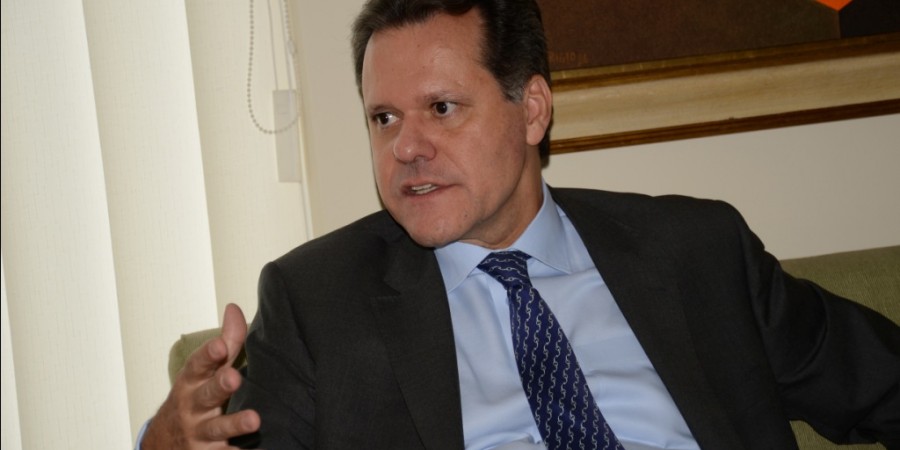A Vibrant Brazil Under New Regime

ALFREDO LEONI
Ambassador of Brazil Talks to Centreline and DNA
Ansar Mahmood Bhatti
The Ambassador of Brazil Mr. Alfredo Leoni talked to Centreline and DNA and during this exclusive talk he particularly talked about the recently-held Presidential election in Brazil in which the incumbent President emerged as victorious. The Ambassador touched upon various challenges that his country is facing these days. He also talked about the success story of Brazil besides dilating upon Brazil role in the international forums. Here are excerpts from his interview.
Let us begin with the re-election of Dilma Rousseff as President of Brazil, do you think her re-election means opting for a better Brazil?
Let me tell you that the Presidents, governors and mayors can be re-elected as per the Brazilian constitutions. They can run for re-election only once. There is a lot of discussion in Brazil about this system. Many people in Brazil think that it would be better to have a mandate for five with no re-election. I would say the system which Brazil has today works quite well and it is not a bad idea that a President stays up to eight years. The problems is with the election of the President because when a president who is in power is running for re-election he or she does not know whether she or he is a presidential candidate or the President of the country.
People think, a presidential candidate should not have the support and structure, which may help him or her during the election campaigns. There is a also a view in Brazil that the incumbent president should not have lived in the Presidential palace during the electioneering. The opponent candidates have their reservation on this system and they believe the incumbent candidate may use official resources during the election drill. I think four years or even five years a too short a period to accomplish something. Therefore, I think eight years a term is reasonable enough. In Brazil Senators have six years of tenure
What according to you were the main factors that led to her victory?
I don’t think it was due to her economic measures that led to her victory. There are certain others reasons. For example the social programme is working very well in Brazil. There is one programme which we call family allowance, which means transfer of money to those families who are really in need of money. Because of this programme a number of Brazilian populations has now come out of poverty. There are other programmes as well and let me tell you all these programmes are inter-linked. All these programmes come under the umbrella of our main programme which is called Zero Hunger Programme. Owing to these programmes now Brazil is out of United Nations list of poor countries.
As regards your question about President Dilma, as you may know her party has been in power for 12 years now therefore they had enough time to rule the country. I think this factor also contributed towards her success.
Against her, I would say the economy of Brazil is far from idea. We are still experiencing very low economic growth with inflation going up. She will have to focus much on the economic situation. Then, corruption has also been a problem in Brazil. We are facing a big scandal in the Brazilian state owned company. The opposition took very much advantage of corruption cases and exploited especially the corruption in Oil Company.
Regarding your question about football world cup, I don’t think it was an issue during the election campaign. Brazil overall was a success story for Brazil though Brazil team did not perform up to the expectations. The most significant issues as I said before were the social programmes.
How would you describe Brazil foreign policy?
Brazil has to do more in order to reach out to especially the developed countries such as Europe. Then Brazil I think was somehow slow to sign certain international agreements. The presidential election as you may know was neck-and-neck competition. She had a narrow win over her opponent, which means a large number of people voted against her. As per the final election results she got 53 per cent votes while her opponent got 50 per cent. Over 50 million people voted against her. Registered voters were over 142 million but 20 per cent did not turn up. About 110 million people voted in the election. She has to deal with challenges especially in the field of economy and she has hinted at appointing a new finance minister. Likewise some other reshuffling in her cabinet is also likely.
Brazil maintains a principled stand on the expansion of UN Security Council. As you know, Brazil wishes to have a permanent seat at the UNSC. We believe the UNSC should be expanded and new members should be admitted without veto power. Let me be frank here that there was not much progress on this particular issue during the first term of President Dilma.
In Brazilian constitution mid -term elections are not possible simply because we are not a parliamentary system. So President cannot be removed before his or her term. Majority of federal ministers in Brazil are politicians. So, the next elections will surely take place after four years.
Tell us something about the voting system?
It a good question and really would like to talk about this in details. Since 2000 we have electronic voting system. When polls were closed i.e 5 O clock in the evening, results were announced after three hours. Brazil is a huge country and it is a daunting task to send these voting machines especially to the regions such as Amazon. But the election court managed the elections quite successfully. There were about 72 foreign observers who were monitoring the elections. Chances of irregularities during the voting are minimal as this electronic system works quite efficiently.
There is an election court in Brazil that conducts the elections. A judge of Brazil Supreme Court is the head of the election court. In Brazil, judges are appointed purely on merit and without any political influence therefore it is very difficult to influence them. All judges are career employees, who are elevated as judges after taking certain exams.
Since you are completing your term in Pakistan are you satisfied with the level of relations between the two countries?
Brazil and Pakistan have had intense interactions in the field of agriculture. The Pakistan food minister Bosan Brazil and upon his return I met him in his office and he told me that he was very much satisfies with his visit.
Regarding Brazil, Pakistan relations, I would say during my stay here many doors were opened vis a vis promotion of bilateral cooperation in various fields. We are much busier now as we used to be. The amount of visas that we used to issued four five years ago has almost doubled. Our economic and cultural sections at the Embassy are now every active and working assiduously towards cementing of bilateral relations. Especially our cooperation in the field of agriculture sector has been phenomenal and I hope mutual cooperation in this particular field would continue to grow even in the coming days.
Let me tell you that five years ago we had zero Pakistani students were in Brazil but now we have more than 100 Pakistani students so when these students go back to Pakistan they share their experiences about Brazil, which are extremely useful for Pakistani people to know more about Brazil and its culture. People to people diplomacy are yet another way to promote bilateral relations that is why my focus has been on further reinforcing such relations.
To increase volume of trade was my top most priority because if you have good trade relations, you can do many other things quite easily such as cultural events, sports activities and interaction in education sector.
Brazil has been for many years the largest trading partner of Pakistan in Latin America, although our volume of trade is not that much significant and needs improvement. Our bilateral trade volume stands at $ 250 million per annum, which of course can reach USD one billion with a little bit of effort. Also allow me to say that if this trade is done directly without involving a third party the figures can also go up drastically.
I wish I would have more resources to do what I have done but in a much wider scale. When I arrived in Pakistan four and half years ago, I realized Brazil was not well known in Pakistan. Brazil was only known because of football and carnival but I am pleased to tell you that Pakistani people now know Brazil for many reasons including its being a friendly country towards Muslims; a country that heartily welcomes Pakistani students; art lovers; businessmen and sportsmen. Pakistani people are very hard working and responsible. All those Pakistanis working at the embassy are surely putting in their best efforts for promotion of bilateral relations. Brazil, as you know, extended all possible help to Pakistan whenever it was hit by natural calamity such as earthquake or floods.
Related News

The Prophet’s Dignity: A Line Muslims Will Never Let Be Crossed
by Muhammad Mohsin Iqbal In every era of human history, certain individuals have risen aboveRead More

“Israel: A U.S. Outpost to Exploit Middle East Resources”
By Qamar Bashir The world has long decried Israel’s brutal campaign in Gaza. From charredRead More


Comments are Closed